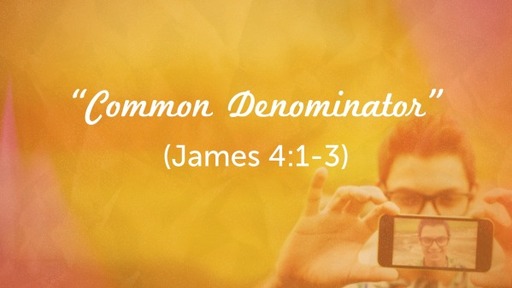"Common Denominator" (James 4:1-3)

Notes
Transcript
Scripture Reading:
Introduction: What is a common denominator?
Introduction: What is a common denominator?
A common multiple of the denominators of a number of fractions (Webster)
A common trait or theme (Webster)
James will give us here a single common denominator for two things.
Transition: Context & Outline
Transition: Context & Outline
This fits into a reoccurring theme: Practicality of Religion in Relationships
James 1:27
James 2:1
James 2:8
James 2:15–16
James 3:9
James 3:16
Section Outline:
Relationship with People (vv. 1-2a) - BOOKEND
Relationship with God (vv. 2b-10) - CORE
Relationship with People (vv. 11-12) - BOOKEND
James starts with...
The cause for ...
Conflict with People (vv. 1-2a)
Disappointment in Prayer (vv. 2b-3)
Notice the common denominator in both.
Conflict with People (vv. 1-2a)
Conflict with People (vv. 1-2a)
What is the cause for conflict with people?
Passions/pleasures/desires - think of it as the “drive” behind the doing and the way we relate to others.
James warned us about our personal desires (James 1:14–15).
But each person is tempted when he is lured and enticed by his own desire. Then desire when it has conceived gives birth to sin, and sin when it is fully grown brings forth death.
This word usually has a negative connotation (Titus 3:3).
For we ourselves were once foolish, disobedient, led astray, slaves to various passions and pleasures, passing our days in malice and envy, hated by others and hating one another.
This “drive” is often more self-mindful and self-promoting than it is God-mindful and God-promoting. Self rather than Spirit lead. This can cause conflict in relationships (James 3:16).
James wants us to consider that we are often at least a part of the problem. James wants us to examine our personal motives in the conflict we are having with others. What is it really about for you?
How serious is it?
It is life or death - murder
Not literally except in extreme cases.
Figuratively (Matthew 5:21–22; 1 John 3:15).
“You have heard that it was said to those of old, ‘You shall not murder; and whoever murders will be liable to judgment.’
But I say to you that everyone who is angry with his brother will be liable to judgment; whoever insults his brother will be liable to the council; and whoever says, ‘You fool!’ will be liable to the hell of fire.
Everyone who hates his brother is a murderer, and you know that no murderer has eternal life abiding in him.
It is ultimately the same spirit/heart.
Notice the personally motivated striving here that is against others.
So, what is a common cause for conflict with people? Self-centered desires
Disappointment in Prayer (vv. 2b-3)
Disappointment in Prayer (vv. 2b-3)
How do we know that James is talking about prayer?
Jesus Christ spoke in the same way about prayer (Matthew 7:7–11).
“Ask, and it will be given to you; seek, and you will find; knock, and it will be opened to you.
For everyone who asks receives, and the one who seeks finds, and to the one who knocks it will be opened.
Or which one of you, if his son asks him for bread, will give him a stone?
Or if he asks for a fish, will give him a serpent?
If you then, who are evil, know how to give good gifts to your children, how much more will your Father who is in heaven give good things to those who ask him!
The follow-up context is about relating to God.
What is the cause for disappointment in prayer?
Passions/pleasures/desires - same
Reason #1 - we don’t pray - due to self-centeredness
Reason #2 - we pray selfishly
This is not the only reason we do not get everything we pray for (John 14:13–14; 1 John 5:14–15).
Whatever you ask in my name, this I will do, that the Father may be glorified in the Son.
If you ask me anything in my name, I will do it.
And this is the confidence that we have toward him, that if we ask anything according to his will he hears us.
And if we know that he hears us in whatever we ask, we know that we have the requests that we have asked of him.
But this is one reason…because what we want is often more self-mindful and self-promoting than it is God-mindful and God-promoting. Self rather than Spirit lead.
So we won’t get what we pray for when it is against God’s will to give it to us.
Our prayers are in tune with our will, but often they are not in tune with God’s will.
How is this related?
The concept of prayer does seems a little “out the blue.”
It is the perfect way to show the connection between our relationship with God and people.
This is not an exhaustive teaching on prayer.
But it is an important teaching on prayer - prayer is seeking God’s will.
The “drive” in both should be God’s will. James is telling us that often it is just the opposite for us.
So, what is a common cause for disappointment in prayer? Self-centered desires
Application:
Application:
Where is change necessary and possible?
You can’t really change others, but...
You can change you.
How is change possible?
The answer is found in verses 4-10.
The area is our relationship with God.
You must have a relationship with God.
You must work on your relationship with God.
Benediction: